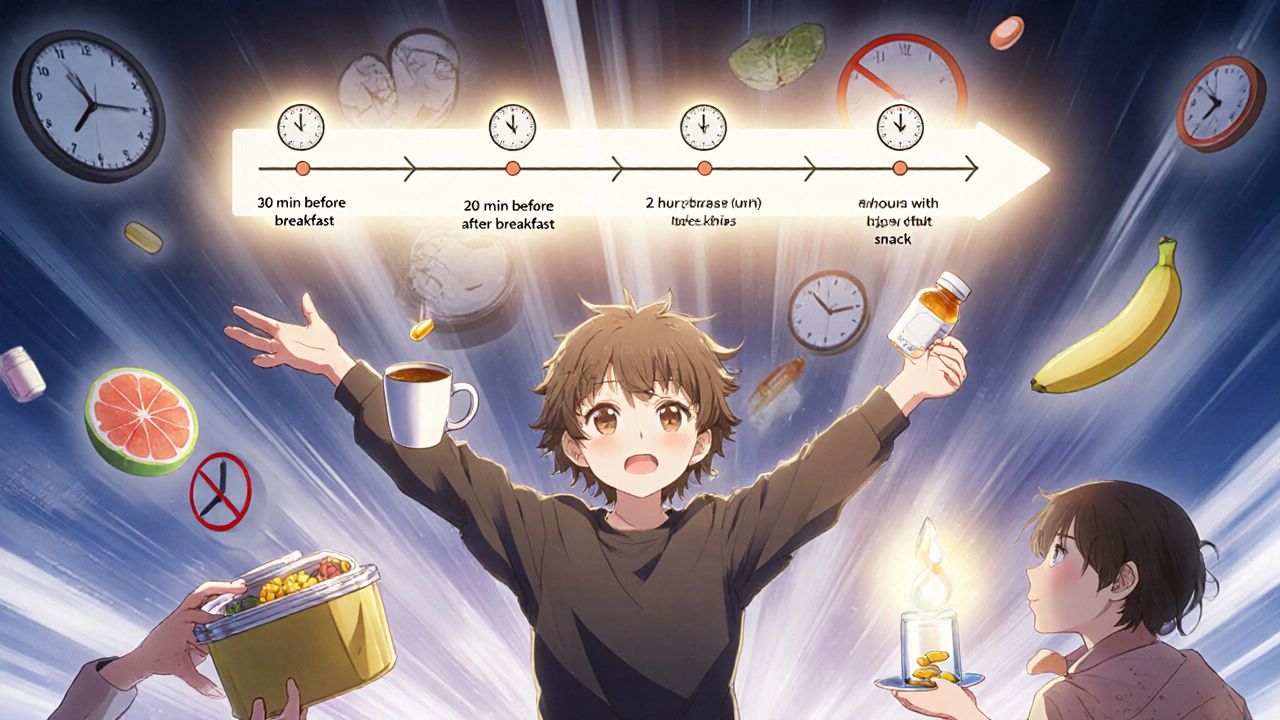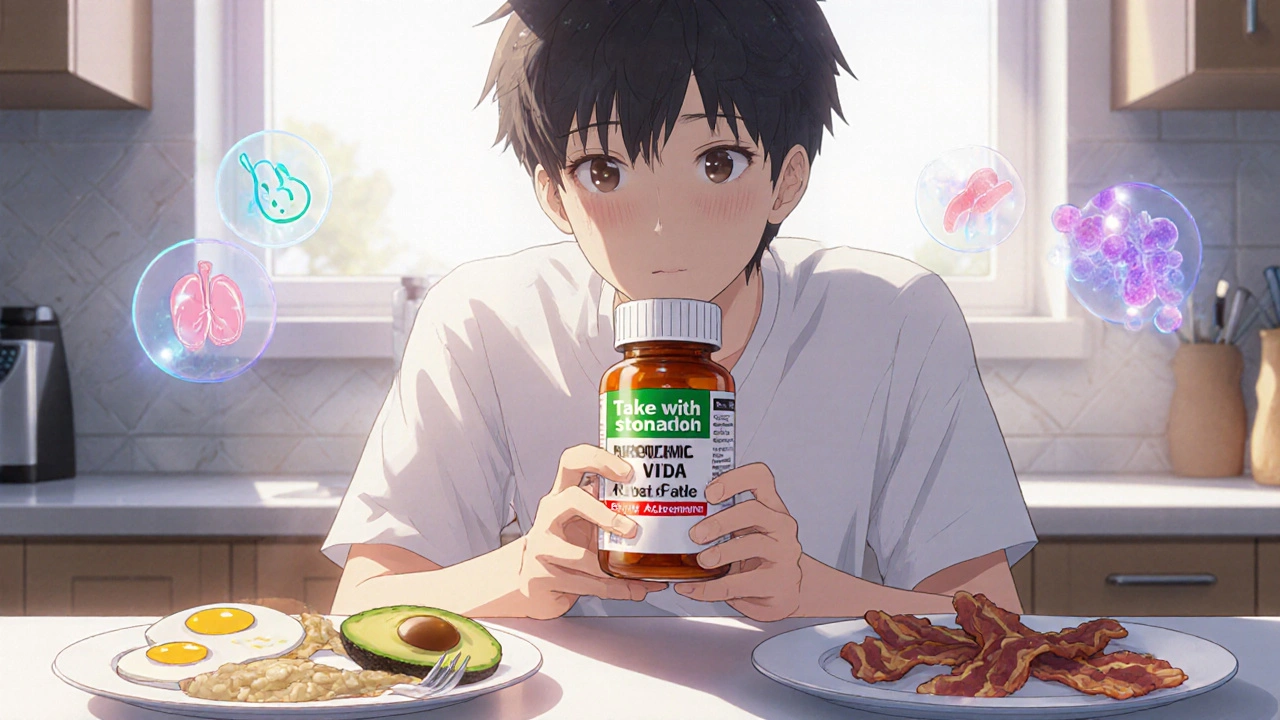Have you ever looked at your prescription label and seen "take on an empty stomach" or "take with food" and wondered why it even matters? You’re not alone. Millions of people take medications every day without thinking about what they’re eating-or not eating-around the time they swallow their pills. But that small detail can make a huge difference in whether the drug works, causes side effects, or even becomes dangerous.
Why Food Changes How Your Medicine Works
Your stomach isn’t just a passive container. When you eat, your body goes into digestion mode. Gastric acid increases, bile flows, your gut starts moving, and blood flow shifts. All of that affects how your body absorbs medicine.
Some drugs need that digestive activity to work properly. For example, certain HIV medications like saquinavir absorb up to 40% better when taken with a high-fat meal. That’s not a suggestion-it’s science. Without that meal, the drug might not reach the levels needed to fight the virus.
On the flip side, food can block absorption. Tetracycline and doxycycline, two common antibiotics, bind to calcium in dairy products, eggs, or even fortified orange juice. That binding means your body absorbs up to half the dose you took. If you’re taking it for an infection, that could mean the infection doesn’t clear-and might even grow resistant.
It’s not just about what you eat. Grapefruit juice can interfere with over 85 medications, including some cholesterol and blood pressure drugs. It blocks enzymes in your gut that normally break down those drugs, causing them to build up to dangerous levels in your blood.
Medications That Need Food to Work Right
Many common prescriptions are designed to be taken with meals-not just for comfort, but for effectiveness.
- NSAIDs like ibuprofen, naproxen, and aspirin: These can irritate your stomach lining. Taking them with food reduces the risk of ulcers and bleeding. The NHS recommends this for everyone, especially older adults. Some users on Reddit report that eating a banana with their NSAID cuts stomach upset by over 60%.
- Antibiotics like Augmentin (amoxicillin/clavulanate) and Macrobid (nitrofurantoin): Food reduces nausea and vomiting. A 2021 study showed a 20% drop in side effects when taken with food.
- Antiretrovirals like ritonavir and zidovudine: These often cause nausea on an empty stomach. Taking them with a small snack-especially one with healthy fats-can cut nausea from 45% down to 18%, according to patient reports from HIV forums.
- Statins like atorvastatin and simvastatin: These work better when taken with food, especially at night. The liver produces most cholesterol during sleep, and food helps the drug reach its target.
Pharmacists in the UK and US have started using color-coded labels: green for "take with food," red for "take on empty stomach," and yellow for "take with high-fat meal." One pilot program saw adherence jump by 31% just by making the instructions visual.
Medications That Must Be Taken on an Empty Stomach
Some drugs are ruined by food-or worse, made dangerous.
- Levothyroxine (for hypothyroidism): This is one of the most common medications in the world. Food can reduce its absorption by 20% to 55%. That means you might feel tired, gain weight, or have high cholesterol-even if you’re taking the right dose. The rule: take it 30 to 60 minutes before breakfast, with water only.
- Tetracycline and doxycycline: As mentioned, calcium, iron, and magnesium in food bind to these antibiotics. Take them at least 2 hours before or after eating, especially dairy, antacids, or iron supplements.
- Didanosine (an HIV drug): Stomach acid destroys it. It must be taken on an empty stomach, 30 minutes before or 2 hours after meals.
- Bisphosphonates like alendronate (Fosamax): These osteoporosis drugs can severely irritate your esophagus if not taken properly. You must take them with a full glass of water, 30 to 60 minutes before eating, and stay upright afterward.
Many patients miss these timing rules because they’re busy. A 2023 GoodRx survey found 42% of people taking five or more medications occasionally get the food rules wrong. The fix? Set phone alarms. One patient told a pharmacist, "I set three alarms every morning: one for my thyroid pill, one for my antibiotic, and one for my coffee. I don’t drink coffee until after my meds."
The Confusing Middle Ground
Not all advice is clear-cut. Some studies contradict each other. A 2015 review in Inflammopharmacology found no evidence that taking NSAIDs with food reduces stomach damage-and suggested taking them on an empty stomach for faster pain relief. But the NHS and German medical societies still recommend food, especially for older patients.
Why the difference? It depends on your risk. If you’re young and healthy, a quick ibuprofen before breakfast might be fine. If you’re 70 with a history of ulcers, skipping food is risky. Your doctor or pharmacist should help you weigh the trade-offs.
Even timing matters. Some drugs need a 1-hour buffer before eating, others need a 2-hour wait after. The Mayo Clinic’s 2024 guidelines say: if your label says "empty stomach," assume it means 1 hour before or 2 hours after a meal. When in doubt, ask.
Real-World Challenges
Life doesn’t always line up with pill schedules.
Imagine you take five medications. One needs food, two need empty stomach, one must be taken with a high-fat snack, and another can’t be near calcium. You’re trying to get kids to school, get to work, and not feel sick. It’s overwhelming.
That’s why pharmacist-led education works. A 2024 American Pharmacists Association study showed that when patients understand why they’re being told to take a pill with or without food, adherence jumps by 44%. People don’t just follow rules-they follow reasons.
One man in Bristol, 68, takes levothyroxine, warfarin, and a statin. He used to forget. Then his pharmacist gave him a small notebook: one page for each med, with a drawing of a plate (for food) or an empty plate (for empty stomach). He keeps it on his kitchen counter. "Now I don’t have to remember. I just look."

What You Can Do Today
You don’t need to be a scientist to get this right. Here’s what actually works:
- Read your label-not just once, but every time you refill. Instructions can change.
- Ask your pharmacist when you pick up a new prescription. They’re trained to explain this stuff.
- Use reminders on your phone. Set two: one for the pill, one for the meal.
- Keep a simple log-even just a sticky note on your fridge. Write: "Thyroid: before breakfast. Antibiotic: 2 hours after lunch. NSAID: with dinner."
- Don’t assume. Just because you take ibuprofen with food doesn’t mean your next antibiotic should be too.
And if you’re ever unsure? Call your pharmacy. Most have pharmacists on call after hours. It’s free. It’s fast. And it could mean the difference between your medicine working-or failing.
What’s Changing in 2025
The FDA is pushing for more precise labeling. Instead of just "take with food," labels will soon say: "take with a meal containing at least 500 calories and 30% fat." That’s because not all meals are equal. A banana isn’t the same as a burger.
Researchers are even starting to use gut microbiome tests to predict how your body will respond to food and drugs together. In early trials, AI models predicted absorption changes with 87% accuracy.
For now, stick with the basics. Your body’s response to medicine isn’t random. It’s predictable. And if you know the rules, you can take control.
Can I take my medication with just a sip of water and a cracker?
It depends on the drug. For medications that need "food," a cracker isn’t enough. You need a proper meal-something with fat, protein, or carbs to trigger digestion. For drugs that need an empty stomach, even a cracker can interfere. Stick to the label: if it says "with food," eat a full meal. If it says "on an empty stomach," avoid anything but water.
What if I forget and take my pill with food when I shouldn’t?
Don’t panic. One mistake usually won’t cause harm. But don’t take another dose to "make up" for it-that could be dangerous. Wait until your next scheduled time and go back to the correct method. If you’re unsure, call your pharmacist. For critical drugs like levothyroxine or antiretrovirals, it’s worth checking.
Does it matter what time of day I take my medicine with food?
Yes. For some drugs, timing affects how well they work. Levothyroxine must be taken before breakfast because your body absorbs it best when your stomach is quiet. Statins work better at night because your liver makes most cholesterol while you sleep. Always follow the timing instructions-not just the food rule.
Can I drink coffee with my pills?
It depends. Coffee can interfere with some antibiotics and thyroid meds. For levothyroxine, wait at least 30 to 60 minutes after taking it before drinking coffee. For others, like certain antidepressants, caffeine can increase side effects. When in doubt, take your pill with water only.
Why do some labels say "with food" and others say "take after a meal"?
It’s about timing. "With food" means take it during the meal. "After a meal" usually means wait 15 to 30 minutes after eating to let digestion start. Some drugs need the stomach to be actively digesting to absorb properly. Others need the stomach to be quiet. The wording is intentional.
Final Thought: It’s Not Just About Pills
Your medicine doesn’t work in a vacuum. It works with your body-and your body works with what you eat. Ignoring food instructions isn’t a small oversight. It’s like trying to start a car with the wrong fuel. You might turn the key, but nothing happens-or worse, something breaks.
Take the time to understand your prescriptions. Ask questions. Use reminders. Keep it simple. Your health isn’t complicated-but it does require attention. And that attention? It’s worth it.






Reviews
I used to take my statin on an empty stomach because I thought it was "cleaner." Then I started feeling like a zombie at 3 PM. My pharmacist laughed and said, "Dude, that’s not a vitamin." Took it with dinner and now I’m actually awake for my kid’s soccer games. Food isn’t the enemy-it’s the co-pilot.
They’re lying to you. The FDA doesn’t care if you live or die-they care about profit margins. That "take with food" label? It’s designed to make you buy more groceries so Big Pharma can upsell you supplements. They know if you eat right, you won’t need half these pills. And grapefruit? That’s not an interaction-it’s a warning they don’t want you to hear. Wake up.
Wait wait wait… I read somewhere that Ayurveda says food and medicine should NEVER be taken together because it disrupts prana flow? And also, in ancient Tamil texts, they used to take all meds at moonrise? So… is modern pharmacology just… wrong? Also typo: "levothyroxine" has 3 e’s not 2. I know I’m right.
Love this breakdown! I’m a med student in India and I’ve seen so many patients skip doses because they didn’t get the food timing. One guy took his blood pressure med with milk every morning-didn’t realize it was nullifying it. Once we explained it with a simple diagram (like, pill + milk = nope), he started using a sticky note. Small change, huge difference. Seriously, pharmacists are unsung heroes.
As a pharmacist with 18 years in community practice, I’ve seen this exact scenario play out daily. The real issue isn’t the science-it’s the communication. Most patients aren’t given a clear, visual system. That notebook idea from the Bristol man? That’s gold. I’ve started handing out laminated cards with icons: plate = eat, glass = water only, clock = timing matters. Adherence jumped 50% in my clinic last year. It’s not rocket science-it’s respect for human behavior.
Have you ever wondered if the food labels are secretly tracking your eating habits? Like… what if your pill bottle is linked to your smart fridge? I heard a guy in Ohio got fined because his insulin was taken with a donut and the pharmacy flagged it as "non-compliant dietary behavior." They’re watching. Always watching. And they’re using your medication habits to build your credit score.
Just wanted to say… THANK YOU. I take levothyroxine, warfarin, and a beta-blocker. I used to mix them up constantly. Now I have a little plastic tray with three slots labeled "water only," "with breakfast," "with dinner." I even put a tiny sticker on my coffee mug: "NO COFFEE UNTIL 8:30." I cried the first time I remembered. It’s been 4 months. I feel like a human again. 😊